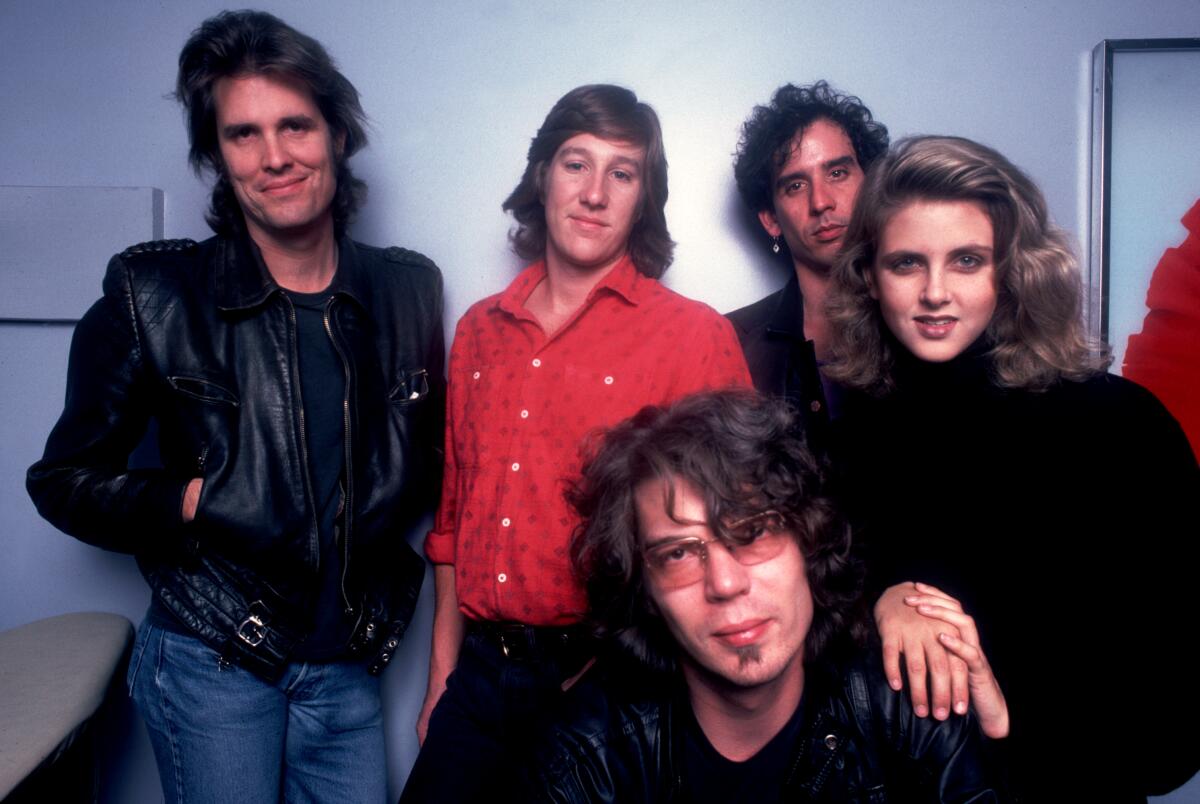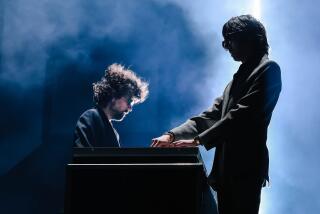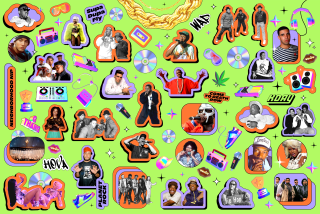Don Heffington, Lone Justice drummer and session musician for roots stars, dies at 70

Don Heffington, a prolific drummer and session musician who played in the Los Angeles roots-rock band Lone Justice in the 1980s and later recorded and performed with stars including Bob Dylan and Dwight Yoakam, died Wednesday at his home in Los Feliz. He was 70.
His death was confirmed by his daughter, Laura Heffington, who said the cause was complications from leukemia.
Once described by music journalist Ira Robbins as “Linda Ronstadt on speed, perhaps, or Dolly Parton backed by the Blasters,” Lone Justice played rowdy but tuneful country-inflected rock built around singer Maria McKee’s high, swooping vocals. The band quickly established itself on L.A.’s club scene, which led to a self-titled 1985 debut produced by Jimmy Iovine and a high-profile gig as the opening act on U2’s arena tour behind “The Unforgettable Fire.”

Yet the lineup that made the “Lone Justice” debut album — McKee, drummer Heffington, guitarists Ryan Hedgecock and Tony Gilkyson and bassist Marvin Etzioni — broke up by the time of the group’s next LP, 1986’s “Shelter,” which teamed McKee with a different set of players for more pop-oriented songs that smoothed out Lone Justice’s punky edge.
Heffington went on to work in different settings with his old bandmates; McKee called him “the coolest and lovingest cat I ever did know” in an Instagram post on Wednesday and wrote that he was “the only original member of Lone Justice I never had any drama with.”
But the group’s splintering opened the door for Heffington to begin collaborating widely with other musicians, including some of the biggest names in roots music. He played on Dylan’s “Empire Burlesque” and “Knocked Out Loaded” albums, on Yoakam’s “Population Me” and on records by Jackson Browne, Victoria Williams, Shelby Lynne, Dave Alvin, Sam Phillips, the Jayhawks, Buddy Miller, the Wallflowers, Amy Rigby and Jimmie Dale Gilmore, among many others.
Founding Fleetwood Mac guitarist Peter Green died in July, five months after Mick Fleetwood organized an all-star tribute concert to his ex-bandmate.
His drumming was steady but nimble, with a sensitivity and musicality that inspired those around him to evoke Ringo Starr.
“Don knew the difference between loud and strong,” Van Dyke Parks, a seasoned composer and arranger who worked frequently with Heffington, told The Times. “He knew how to leave space. His moves were economic. And he was so observant. He learned a lot from watching other percussionists. He knew why Ringo was playing the dyslexic patterns that he came up with.”
Session guitarist Greg Leisz, another of Heffington’s regular collaborators, said Heffington brought “the sensibility of a jazz drummer into blues and rock and country situations” and said he had “a unique understanding of how to support a really quirky singer-songwriter” like Williams or Dylan.
“He’d follow the singer’s vibe and play just the right thing for the song,” Leisz said.
Laura Heffington, who said her father valued improvisation over repetition, recalled a favorite quote of his: “Practicing a song so that you can play it exactly the same way every time is like saying, ‘Hey, that was a great conversation we had! Let’s have that exact same conversation over and over.’”
Music venues have been closed since March 2020, but help is on the way: Clubs that qualify for federal grant money can begin applying on April 8.
Heffington was born on Dec. 20, 1950, in Los Angeles. His mother played upright bass and his grandmother was a drummer. As a teenager, he played jazz but turned his focus to rock ‘n’ roll after hearing Dylan’s mid-’60s work.
Leisz remembered encountering Heffington one night in the ’70s — “might’ve been at the Troubadour,” he said — as the drummer was hanging out with Tom Waits.
“I had no idea what he did, but I was just intrigued by the way he carried himself,” Leisz said. “He had this sort of bohemian, beatnik quality.”
Before he joined Lone Justice, Heffington played as a member of Emmylou Harris’ Hot Band and performed on her albums “Blue Kentucky Girl” in 1979 and “White Shoes” in 1983. A feature on Lone Justice in Spin magazine in 1985 described Heffington’s presence as a kind of professionalizing force, and indeed many in the music business had next-big-thing commercial hopes for the band that never quite materialized.
With a laugh, Leisz said, “I have to believe that Don was — ‘suspicious’ is the wrong word — but that he took all the hype with a grain of salt. He’d been around too long by then.”
Parks agreed, saying Heffington “didn’t spend any time rehearsing victories. He was always more interested in sticking his neck out.”
In recent years, Heffington released a pair of solo albums — of 2014’s “Gloryland,” he told the Argonaut website, “I wanted it to sound like some drunk falling down the stairs while he was practicing the trombone” — and performed regularly as part of the “Watkins Family Hour,” a variety show started by Sean and Sara Watkins of the bluegrass trio Nickel Creek at L.A.’s Largo nightclub.
His survivors include Laura Heffington; a son, John Heffington; and a stepdaughter, Desiree Buckman.
On Wednesday, Sara Watkins recalled hiring her brother, Heffington and bassist Sebastian Steinberg to accompany her on a no-frills tour behind her self-titled 2009 solo debut.
“I was tour managing, and they all just piled into a minivan with me — all the inconveniences and none of the luxury,” she said. “But Don was fully in for the whole thing. Just game to play. To hit the road. To make some music.”
More to Read
The biggest entertainment stories
Get our big stories about Hollywood, film, television, music, arts, culture and more right in your inbox as soon as they publish.
You may occasionally receive promotional content from the Los Angeles Times.











